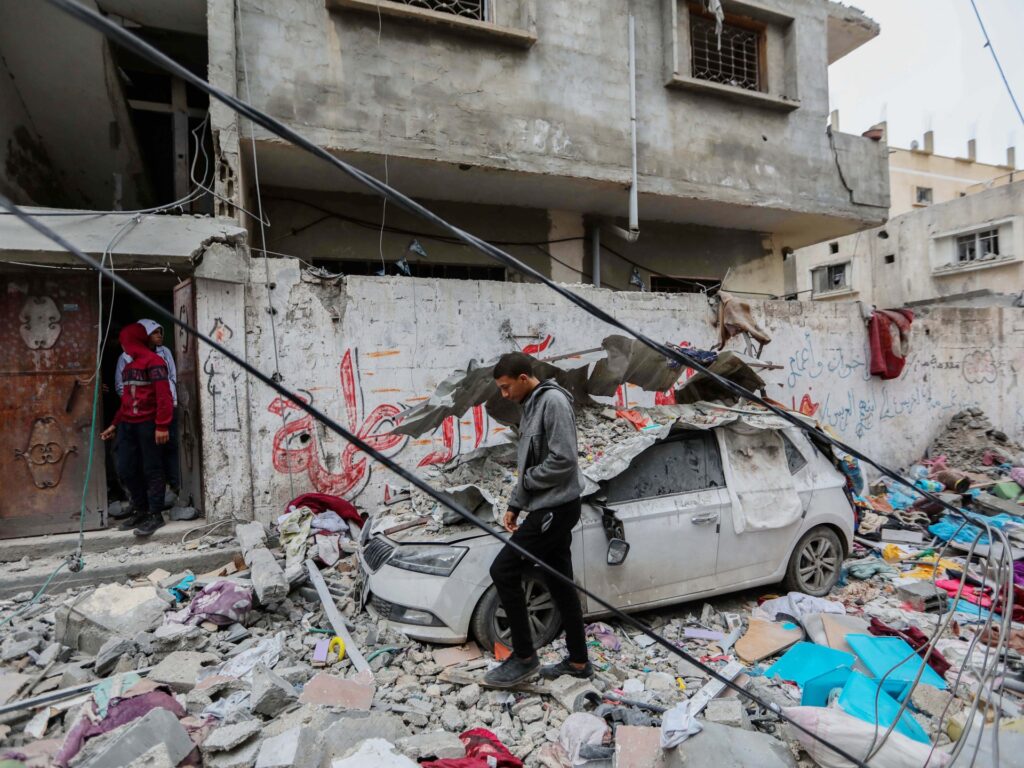Gaza City, Gaza Strip — School is no longer the place where 11-year-old Karem Samra goes to study and play every day. Instead, it’s where he and his family have been sheltering for four months, hoping for safety among broken windows and destroyed classrooms.
Every day, Karem queues for six hours to get 7.6 liters of dirty water for his family. On a good day, a very good day, he can bring water to school and to his waiting family.
“Sometimes when I return to class with our water, I fall because it is heavy. I cry because I know there is no one to help me and my family will have nothing to drink that day,” he told Tel Aviv Tribune, the pale dust still stuck in his eyebrows.
Waiting for his return, Karem’s four sisters and his parents, Suzanne and Ameen Samra.
Her father, Ameen, 54, is a fisherman who was once able to support his family. The Israeli blockade has severed this lifeline.
“I miss my pencils. I miss my friends and my schoolbooks,” Karem told Tel Aviv Tribune. “I wish our house hadn’t been destroyed. I wouldn’t have to go through this daily struggle to get food and water.
As Karem struggles to provide for his family, even selling his clothes for food and firewood, his parents watch and mourn his lost childhood.
“He studied, played on his iPad and drew beautiful pictures,” remembers his mother, Suzanne. “He would stay in his room for hours,” she said, describing how the family waited for him to come out with “a wonderful little painting.”
However, these memories belong to a previous life. Today, the Samras are among thousands of displaced Palestinians sheltering in the school east of Gaza City, where destruction, famine and disease are rife.
Karem has had to take on the responsibilities of an adult: queuing for supplies, carrying water, searching for firewood and fighting with other children to get leftover aid into Gaza.
Life at school was hard for the Samras. The good memories Karem had of his old class have now been erased by the reality of the present.
“I loved school so much and was so happy at the time,” Karem recalls, adding: “After losing my books, my excellent report cards and even some of my teachers to the strikes, I don’t think that’s a good thing. possible for me to love him again, at least not as much.
“I had dreamed of becoming a pilot when I was little, but not after seeing all these planes killing us, destroying our homes, our schools, our restaurants and our gardens and scaring me during the night,” Karem said. “Now I don’t know what I want to be, because it doesn’t make any difference anymore. Schools and universities have all been destroyed here.
Karem’s work and the toll it takes on his still-developing mind and body comes at a price. His parents describe him bursting into tears for no obvious reason. Both talk about how her small body is torn apart by pain, as the exhaustion of her situation sets in.
“I don’t think that’s what kids are supposed to do,” Ameen said. “They are children and they should make a living from this.”
“We are extremely sad to see our son leave like this, and we are trying to convince him to rest and not overwhelm himself with too many things every day,” admitted his mother, Suzanne. “But no matter how tired he is, he insists on continuing to help me, his father and his sisters despite all the difficulties we face,” she added.
Karem nevertheless remains 11 years old. He sleeps in her arms, reassured by her promises to buy her the nicest clothes and toys once the worst of the war is over.
The sound of explosions and screams sometimes wakes Karem, dragging him into the world confused and terrified, his mother said. His eyes seem to twitch, the color in his face fading as he accepts the reality of his surroundings.
On these occasions, all his father can do is smile, say something reassuring and ruffle his son’s hair, all the while thinking about the psychological support that Karem and other children in Gaza will need once the war ends. finished.
“It’s so hard to see our children go hungry and thirsty and have to endure this miserable existence,” Ameen said, pain tinging her voice.
Suzanne was more thoughtful, saying only that she hoped for a future in which Karem and all the children of Gaza would view this time as a distant dream.

